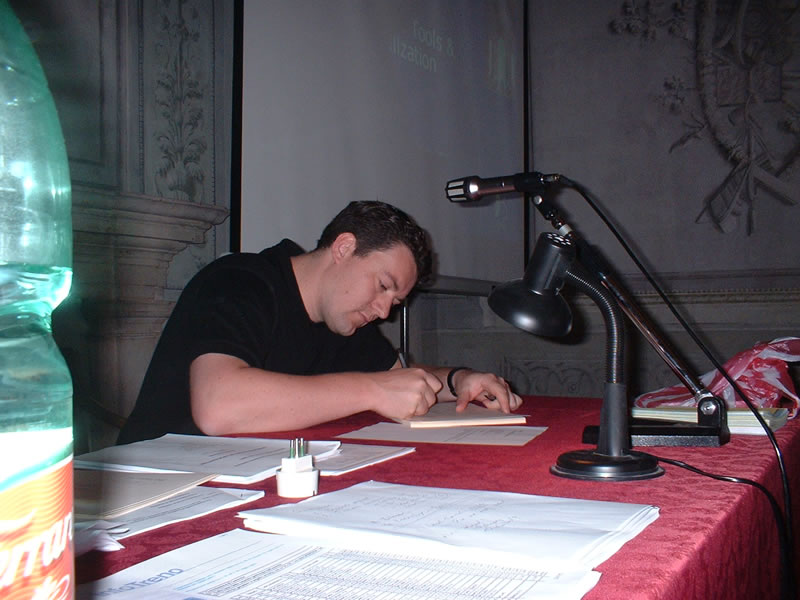
The Consortium for Training Translation Teachers, in cooperation with the Scuola Superiore Universitaria Interpreti Traduttori di Vicenza, is pleased to announce an intensive training seminar to be held in English in the Palazzo Barbaran in Vicenza.
Based on the model used in Tarragona in July 2000, the seminar will focus on the impact of new technologies on translator training. It is designed to bring together both professional translators and translation teachers, and to facilitate exchanges between those groups.
Course leaders: Bert Esselink, Daniel Gouadec, Don Kiraly, Anthony Pym, Federica Scarpa, Margherita Ulrych
Aim
The aim of the seminar is to provide a space for the acquisition of the teaching skills most in demand in the training of professional technical (non-literary) translators at university level. Those skills principally involve the use of electronic tools, awareness of the current processes of technical translation and localization, and interactive use of the teaching space, both face-to-face and via e-learning techniques.
The seminar is designed to address many teaching environments in many countries. It thus does not insist on a profile of any one 'ideal teacher', nor on a set of fixed 'best practices'. Instead, it encourages awareness of a number of approaches and is based on exchange between professional translators and practising teachers.
The four contact days are supplemented by 1) the use of reference texts written by the course leaders, and 2) an optional certificate program that takes place after the seminar.
Program
| Monday 22 | 08.30-09.30 | Registration | |
| . | 09.30-10.30 | Pym |
Institutional frameworks: |
| . | 10.30-12.30 | Ulrych | The changing profile of translators and translator education: the case for an evidence-based approach (corpora). |
| . | 15.00-18.00 | Scarpa | Language issues in localization: - General concepts of localization - General translation approach - Translating User Interface - Translating User Assistance - Translating Packaging - Cultural challenges - Exercises |
| . | 18.00-19.30 | Workshop on pedagogical progression | |
| Tuesday 23 | 09-30-12.30 | Gouadec | Know-how based learning: PRETRANSLATION 1. Getting the job 2. Analysing the document 3. Making estimates and a rough planning 4. Specifying the job 5. Contracting 6. Setting up the environment and tools 7. (IT/TM/Platforms/Web extractors) 8. Planning PRETRANSFER 1. Setting up the material (+kit) 2. Disassembly 3. Analysing the document (2) 4. Ambiguities 5. Targets for documentation 6. Terminology 7. Phraseology 8. Non standard items 9. Options 10. Documentation/product analysis 11. Getting the raw materials (terminology, etc.) 12. Preparing the ready-for-translation version 13. Validating everything (sample translation) |
| . | 15.00-18.00 | Gouadec |
TRANSFER |
| . | 18.00-19.30 | Round table on local labour markets: How to select students, teachers, and texts. |
|
| Wed. 24 | Optional activities | Morning: Optional software demonstrations (DéjàVu, Trados WB) 16.30-17.30: Pym: "For a Sociology of Localization" (connection with the seminar "Lengua y traducción en las sociedades de comunicación", Universidad Internacional Menéndez y Pelayo, Santander, Spain). |
|
| Thurs. 26 | 09-30-12.30 | Kiraly | Principles of collaboration in translator education: What is "interactive" teaching? Why is it suited to translator education? Who should be involved in the interaction? Where is interactive learning appropriate? When should interactive learning come into play? |
| . | 15.00-18.00 | Kiraly | The practice of collaborative learning: How to promote interaction in the translation classroom - A collaborative learning experience |
| . | 18.00-19.30 | Round table on evaluation procedures | |
| Friday 25 | 09-30-12.30 | Esselink |
Electronic tools and localization: |
| . | 15.00-18.00 | Esselink |
The demands of localization: |
| . | 18.00-19.30 | Round table on e-learning |

